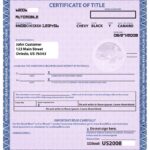Apply for Duplicate Car Title: A Complete Step-by-Step Guide
Apply for Duplicate Car Title: A Complete Step-by-Step Guide

When you lose or damage your vehicle title, replacing it swiftly and accurately is crucial. A car title is more than just a document—it's legal proof of ownership. Whether it's lost, stolen, destroyed, or mutilated, the process to obtain a duplicate car title can vary slightly by state, but the general steps remain consistent. Below, we’ve outlined the comprehensive process to help you apply for a duplicate car title efficiently and legally.
What Is a Duplicate Car Title?
A duplicate car title is an official replacement for your original vehicle title, issued by your local Department of Motor Vehicles (DMV) or Department of Transportation (DOT). It holds the same legal status and is required when transferring ownership, registering the car in a new state, or applying for certain types of loans.
Common Reasons for Requesting a Duplicate Car Title
Understanding the circumstances that necessitate a duplicate title helps you determine if you qualify:
Lost or Misplaced: The most common reason for applying.
Stolen: Reported to authorities and DMV for security.
Damaged or Illegible: Water, fire, or general wear may render it unusable.
Destroyed: Physically destroyed beyond readability.
Altered or Incorrect Information: Requires official re-issuance.
Who Can Apply for a Duplicate Car Title?
Only certain individuals or entities may legally apply:
Registered Owner: The person listed on the original title.
Lienholder: If there's an active loan, the lienholder may apply.
Authorized Agent: With a valid power of attorney.
Ensure your identity matches DMV records exactly to avoid delays.
Documents Required for Duplicate Title Application
Be prepared with the correct and complete documentation. Missing paperwork can result in processing delays or denial.
Completed Duplicate Title Application Form (varies by state, e.g., Form REG 227 in California, Form MV-1 in Georgia).
Proof of Identity: Valid government-issued ID (driver’s license, passport).
Vehicle Information: VIN, license plate number, make, model, and year.
Lien Information: If a lien exists or has been satisfied, include lien release documentation.
Power of Attorney: If acting on behalf of someone else.
Odometer Reading: Some states require mileage disclosure.
How to Apply for a Duplicate Car Title
1. Visit Your State’s DMV Website
Each state has its portal, forms, and requirements. Always begin by accessing the official DMV website to download the correct form and review specific instructions.
2. Complete the Application Form Accurately
Fill out the duplicate title request form completely. Double-check every field, including:
Owner’s full legal name
Current address
Vehicle Identification Number (VIN)
License plate number
Odometer reading (if required)
3. Submit the Application
There are typically three methods:
In-Person
Visit your local DMV office
Bring all documents
Pay the required fee (usually between $5 and $25, depending on your state)
By Mail
Send the completed application with copies of ID and payment
Use a traceable mail service to ensure delivery
Online
Many states allow online duplicate title requests
Upload digital versions of your documents
Fees for Duplicate Title Applications
Fees vary by state but typically fall within this range:
$5–$25
Additional charges may apply for expedited processing or notary services
Some states offer rush title services for an extra fee—ideal if you need the title urgently.
How Long Does It Take to Receive a Duplicate Title?
Processing times depend on your state’s DMV and how you submit your application:
Online Requests: 5–10 business days
In-Person: Immediate issuance in some states
Mail-In Applications: 2–4 weeks
Choose expedited shipping or priority service if your need is urgent.
What If There Is a Lien on the Title?
If the title has a lienholder, their authorization or release document is mandatory. Some DMVs send the duplicate directly to the lienholder unless a notarized lien release is provided.
Steps to follow:
Request a lien release if the loan is paid off.
Submit the release along with your application.
Confirm whether the DMV requires the lienholder to initiate the request.
Can You Apply for a Duplicate Title Without a Notary?
Many states require notarization of your application or supporting documents, especially for:
Out-of-state mail-in requests
Applications involving lien releases
Power of attorney situations
Check your local DMV’s notary rules before submission.
Special Considerations for Out-of-State Vehicles
If your vehicle was originally titled in another state but is now registered locally, ensure:
You provide documentation from the original state
You complete any interstate title transfer requirements
You may need to first transfer the title to your current state, then request a duplicate
Preventing Title Loss in the Future
To avoid needing a duplicate again:
Store it in a fireproof, waterproof safe
Do not carry the title in your vehicle
Consider digital copies for recordkeeping, though only originals are valid
Final Thoughts
A duplicate car title is a critical document that should be replaced promptly if lost or damaged. Following your state’s specific guidelines, ensuring accurate documentation, and selecting the right submission method will streamline the process and help you secure legal proof of ownership without delays.
Comments
Post a Comment